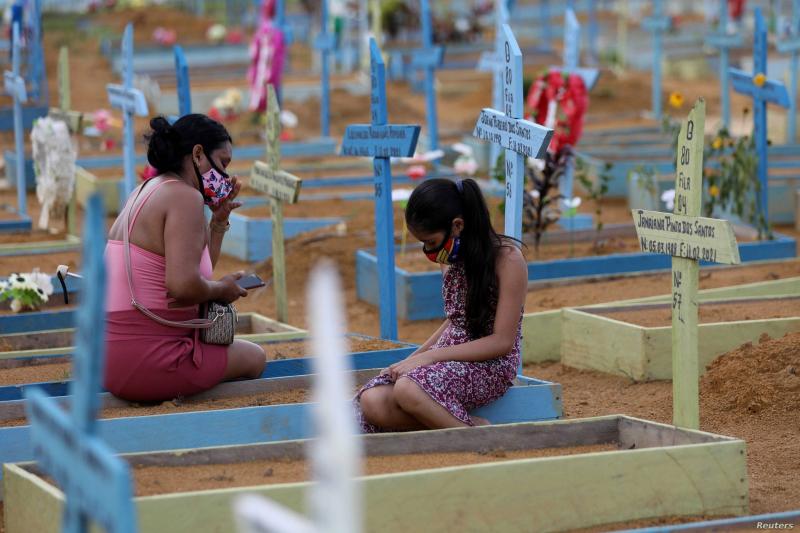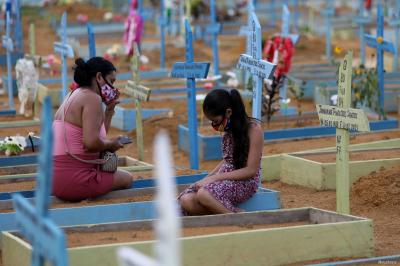Public health experts predict lasting consequences for children who have become orphans due to the loss of one or both parents, including greater risks for mental health issues, poverty, and abuse. They say that governments have largely overlooked the plight of these families, who are still struggling to combat the virus that primarily killed the elderly, before aggressive mutations led to deaths among younger individuals. Andres Villavicius, a physician and epidemiologist at the U.S. Centers for Disease Control and Prevention who co-authored a Lancet study, remarked, "The speed at which this is happening is astonishing." He adds in an interview with The Wall Street Journal, "It is a problem that affects every part of the world, and it is a crisis that will remain. If a person becomes an orphan at a young age, they will be at risk for many years."
The pandemic resulted in an estimated 1.1 million children worldwide losing at least one parent between March 2020 and April 2021, according to a study published by the medical journal "The Lancet." Many of the hardest-hit countries are in Latin America, which accounted for about one-third of COVID-19 deaths despite having only 8% of the world's population. Peru was the most affected, with an estimated 10.2 children per 1,000 losing a parent according to the study published in July. Mexico, Brazil, and Colombia also ranked among the top five countries in the study. Despite early lockdowns, the pandemic severely impacted Latin American countries, where crumbling healthcare systems left hospitals overcrowded and oxygen supplies frequently ran out, leading to many deaths at home. Earlier this year, deadlier variants swept through South America, causing more young deaths as governments initially struggled to secure vaccines.
In India, over 78,000 children lost one or both parents due to COVID-19 complications between April 2020 and July 2020, according to the National Commission for Protection of Child Rights. The organization reported to the Supreme Court that Maharashtra, home to financial hub Mumbai, had over 13,000 affected children.
### Struggles with Loss
Some countries are supporting orphans and new caregivers, who suddenly bear the financial burdens and emotional demands of raising these children. Peru provides cash transfers to children whose parents died from the virus, while India offers educational assistance and school placements, alongside around $13,000 deposited into accounts accessible between the ages of 18 and 23.
In Manaus, a hotspot for the pandemic in Brazil, volunteers initiated a program to assist COVID orphans by providing food and diapers for their caregivers. Currently, 175 children and teenagers—many from poor families—are receiving help, according to Glauco Galizio, who launched the program.
In Peru, on several nights a week, four-year-old Sofia Velis wakes up calling for her mother, who used to hug her in bed. Sofia's mother died from COVID-19 in April, so the responsibility for the little girl now falls on her aunt, Janet Navarro. Navarro, who has three children, has taken on the care of her late sister's five children. "She cries and cries. She screams with her eyes closed, 'I want my mom... I want my mom,'" she said.
Ryan and Rowan Lucato moved in with their aunt in the Brazilian town of Gondia after losing both parents within two weeks of each other. Their aunt, Ellen Cristina de Souza, rented a new house to accommodate Ryan, 20, and Rowan, 11, along with their dogs. Ryan expressed gratitude for their aunt and her family: "Thank God we have them. There are children who end up alone in the world."
De Souza, 37, had to leave several cleaning jobs to help care for Rowan, who has autism and whose condition worsened after the death of their parents. Family members say he has become more anxious, stuttered more, and started blinking his eyes frequently. De Souza, who assists Rowan with his schoolwork, stated, "I will do everything I can for them. My mom often asked me if I would have another child. Now God has given me two children."




